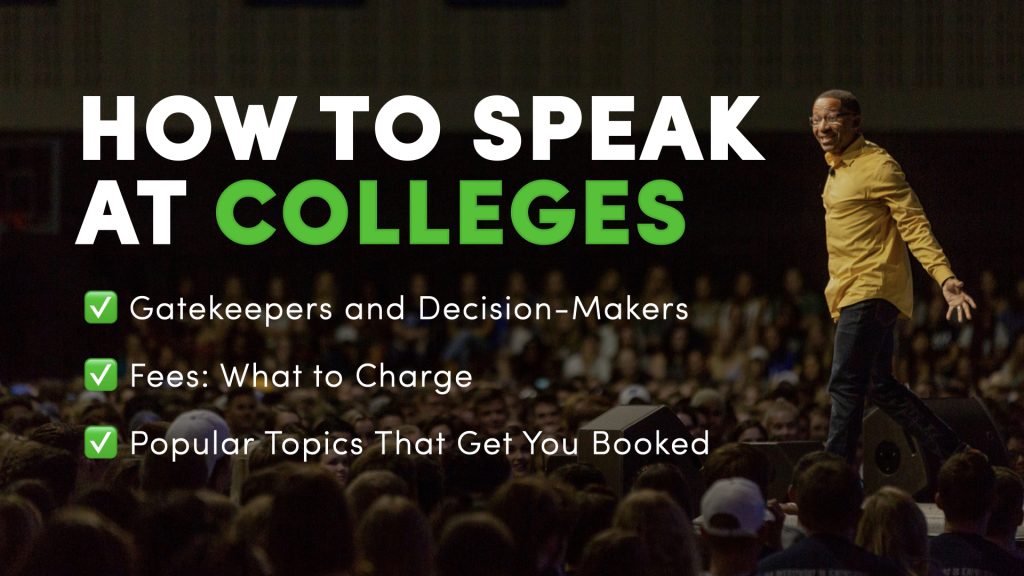How to Speak at Colleges: The Gatekeepers, The Fees, The Popular Topics

Colleges do not book passion. They book solutions.
If you want repeat bookings on campuses, speak to what they measure, prove you can deliver, and make it easy to say yes.
The Gatekeepers: Who Actually Books College Speakers
Depending on the campus and budget source, decision-making power resides with a few predictable teams. Build a targeted list and tailor your pitch to each one.
- Student Activities / Programming Boards: Often funded by student fees. They program large, high-energy events and welcome proposals with clear outcomes and easy logistics.
- First-Year Experience and Orientation: Outcomes are engagement, belonging, and transition skills. Timelines are tight, so be turnkey.
- Residence Life: RA trainings and hall programs. Practical workshops beat keynotes here.
- Counseling and Wellness Centers: Mental health skills, stress management, and help-seeking behaviors. Research backed content wins.
- Athletics, Greek Life, Career Services: Niche needs with clear calendars. Speak directly to their metrics.
Action: Identify 3 to 5 likely gatekeepers per campus, find the coordinator’s name and email, and log who controls funds versus who influences content.
The Fees: What To Charge Without Guessing
Price is a strategy. Start with a realistic range, then earn your way up with proof and referrals.
- Early Career Baseline: $2,500 to $5,000 for a 60 to 75-minute keynote with a Q&A. Workshops can be similar if they are interactive and outcome-focused.
- Established Campus Speaker: $5,000 to $8,000 when you have a track record with colleges, a strong demo, and clear demand.
- Multi-Event Packages: Offer value, not discounts. Example, keynote plus two workshops plus office hours, priced as a bundle with one travel line item.
- Travel: Flat travel can speed approvals.
- Virtual: Price at 60 to 75 percent of your in-person rate when outcomes are equivalent and you provide engagement tools.
Action: Publish a one-sheet with your standard fee, inclusions, and common add-ons. Remove friction and you remove objections.
Want to get paid to speak at colleges?
FREE Video Training: The 7 Steps to Break Into the Education Market
The In-Demand Topics: Speak To Their Measured Outcomes
Colleges purchase results, not vague inspiration. Tie your topic to what they track.
- Mental Health and Belonging: Practical coping skills, peer support, help seeking, and building community.
- Leadership and Student Success: Influence skills, conflict communication, time and energy management.
- Career Readiness: Storytelling for interviews, networking scripts, personal brand basics, portfolio building.
- Digital Wellbeing and Social Media: Attention management, online civility, and reputation risks.
Action: Write talk descriptions that start with the problem, state learning objectives, and list three specific takeaways students will practice during the session.
Proof First: What Buyers Need To See
- Demo Video: 3-5 minutes that showcase the substance of your message (80% of the video), testimonials from other decision-makers (10% of the video), and various b-roll and audience reactions (10% of your video).
- Testimonials: Two short quotes from colleges, each tied to a result. Example, attendance, satisfaction, referrals.
- One Sheet: Bio, three program options, outcomes, fees, and tech needs. One page, readable on a phone.
Action: Without proof, outreach is noise. Build these first, then scale contact volume.
Outreach That Lands: Copy You Can Use
Subject: {{firstName}}: for your students?
Email:
Hi {{firstName}},
I work with colleges on {{topic, for example mental health and belonging}}.
Here is a 4-minute video preview and the three outcomes I target.
- Reduce stigma and increase help-seeking
- Teach one coping skill students can use same day
- Equip peer leaders to spot and refer
Any interest? Happy to discuss.
Best,
{{Your Name}}
{{Phone}} | {{Website}}
Action: Keep it short. One link. One clear next step. Follow up twice, one week apart, then circle back before known programming peaks.
Make Event Planners Lives Easy: Win The Rebook
- Fast paperwork: Contract, W-9, invoice, Certificate of Insurance if needed.
- Clear tech: Provide a simple AV list and a backup plan. Show up early.
- Student engagement: Build in moments for interaction that are safe and structured.
- Post event: Thank you note, slides or resources if promised, testimonial request with a simple two-line prompt such as “How would you convince another college to book _____?”
Action: Reliability is a moat. Planners remember the speaker who made their job easier.
Turn One Gig Into Five
- Referral ask: At the debrief, ask who else on campus or in their regional association should see this program.
- Clips and photos: Capture permission in advance and pull three social ready moments within 48 hours.
- Regional conferences: Ask which consortia or associations they attend and pitch a session.
Action: Momentum compounds when you ask for it, politely and specifically.
Quick FAQ
Who should I contact first? Start with Student Activities and the office most aligned to your topic. CC a secondary contact only if it adds relevance, not pressure.
How do I set my first fee? Anchor at a fair market baseline, then adjust based on demand and proof. Package add ons rather than discounting core value.
What if I have no college testimonials yet? Use adjacent proof, high schools or nonprofits, and collect a college case study as fast as possible.
Should I pitch keynotes or workshops? Offer both. Lead with the format that best serves the outcome your gatekeeper cares about.
Ready to get serious about speaking at colleges?
FREE Video Training: The 7 Steps to Land $2,500+ Education Events
